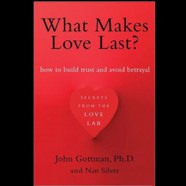
This blog post piggybacks on my previous post: “Shared Relationship Control.” I ended that post as follows: “In making a (relationship) investment, you choose to allow the other person’s activities to influence (control) certain aspects of your life. It’s called ‘shared control,’ and it is most certainly implied in the relationship vows we take. ‘I do’ implies the abdication of absolute personal control. But, can any of us say we fully understood this at the moment of commitment? No. This doesn’t mean that we should never ask our partner to change something about their behavior. It means that we ask, and then accept their dilatoriness, even noncompliance, should that be the verdict. It means that we must find other ways to reduce our personal stress than arm-wrestling our partner for personal control. ‘Shared control’ is the language of togetherness. ‘Personal control’ is the language of separateness. In a newly released book, What Makes Love Last? How to Build Trust and Avoid Betrayal (2012), relationship specialist John Gottman (Ph.D., University of Washington) talks differently, but similarly…about this theme of ‘shared relationship control.’ I recommend it.”
It is to this book by Gottman that I now turn and continue the theme of “Shared Relationship Control (Part 2).”
As indicated by the subtitle, Gottman juxtaposes “trust” and “betrayal.” “Betrayal”, he writes in the Introduction, “is not always expressed through a sexual affair. It more often takes a form that couples do not recognize as infidelity….(for example), pervasive coldness, selfishness, unfairness, and other destructive behaviors are also evidence of disloyalty and can lead to consequences as equally devastating as adultery….(But) I now know that there is a fundamental principle for making relationships work that serves as an antidote for unfaithfulness. That principle is ‘trust’ (which Gottman admits sounds like ‘trumpeting the obvious’).” “Trust,” he adds, “removes an enormous source of stress because it allows you to act with incomplete information. You don’t subject your mind and body to constant worry, so the complexity of your decision making plummets.” (pp. xvii-xix). Although Gottman definitely addresses the subject of “betrayal as sexual infidelity” (Chapter 3: “I Didn’t Mean for It to Happen: Why Cheaters Cheat”; Chapter 4: “Men, Porn, and Sex Drives”; and especially Chapter 10: “Recovering from Infidelity”), Chapter 5 expands “betrayal” to include “Ten Other Ways to Betray a Lover”. Chapter 5 is a must-read for every committed couple relationship.
The following represents Gottman’s understanding of “shared relationship control” (in my view):
“Game Theory was popular during the Cold War, when analysts hoped that scrutinizing decision making would let them better predict the behavior of hostile groups or nations during confrontations….(where opposing nations) aspire to maximize (their) own benefits – what game theorists refer to as…payoffs. The zero-sum game is probably the best known game theory concept. In such a contest, each side wants to maximize its own payoff and prevent the opponent from achieving anything. Football is a zero-sum game: when the New York Jets win, the New England Patriots lose. But adversaries are not always interested in an all-or-nothing outcome….Most game theory scenarios assume that in order for one side to get the greatest payoff it must influence what the other side does. Here’s an example, using a couple in a new relationship. Imagine that Jenny and Al have just moved into a town house and want to figure out the best way to share the hated housework. Game theory takes for granted that, (like some nations), Jenny and Al don’t trust each other. This is not an unrealistic assumption….despite their mutual devotion. As rational ‘players,’ Jenny and Al know there are only four ways they can divide the housekeeping. Either neither of them cleans, they both clean, or one cleans and the other doesn’t. Both of them want the best deal they can get….Each of them has determined that getting the other to clean will maximize their own payoffs….(At this point, Gottman offers his mathematical probabilities for both Jenny and Al, and concludes)….The bottom line is that for Jenny to get the best deal she can, she must get Al to clean….To maximize his payoffs, Al is going to have to convince Jenny to clean.” (pp. 2-6)
Gottman concludes:
“The story of Jenny and Al’s dirty town house may seem pretty inconsequential, but it demonstrates distrust with great accuracy. If you don’t have faith in your partner, you take the stance that he or she should change so that you can maximize your own payoffs. Likewise, your partner wants to change your behavior for his or her own selfish reasons. When distrust abounds, neither of you includes the other’s well-being in your calculations. Turn this description of distrust around, and you have my definition of its opposite. Trust….is the specific state that exists when you both are willing to change your own behavior to benefit your partner. The more trust that exists in a relationship, the more you look out for each other. You have your beloved’s back, and vice versa. In a trusting relationship you feel pleasure when your partner succeeds and troubled when he or she is upset. You just can’t be happy if achieving your payoffs would hurt your significant other. Once Al and Jenny develop more trust, they will stop playing hot potato with the laundry basket. They will cooperate and clean together because doing so offers their partner the highest pay-off. Al’s paramount thought won’t be, ‘I better do the vacuuming so Jenny will want to have sex later.’ Instead his thoughts will run, ‘I’m going to vacuum because Jenny worries about turning into a drudge like her mother. I don’t want to make her feel that way.’ Likewise, Jenny’s decisions will take into account her husband’s needs and wants. Trusting each other doesn’t mean that Al and Jenny will always put the other’s needs ahead of their own – that is unlikely to be healthy. But it does mean that their happiness will be interconnected. They will each change their own behavior to increase the other’s payoffs.” (pp. 6-7)
This sounds a lot like “shared relationship control” to me. Doesn’t it you?
Bill Bray, Colorado Springs, CO

